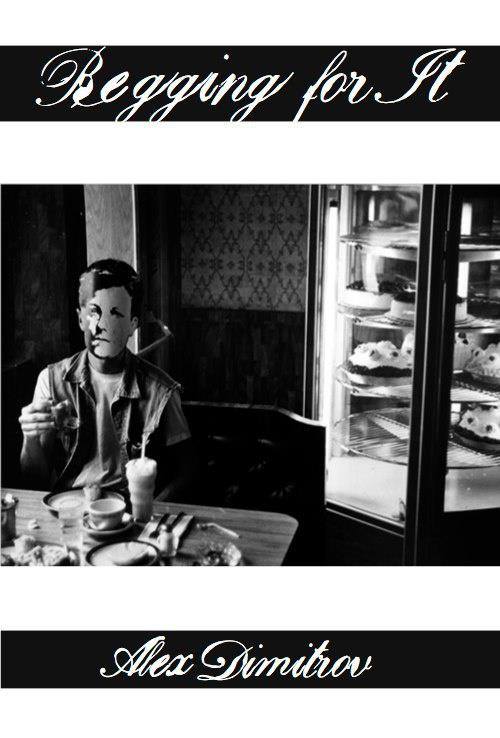Alex Dimitrov: “It’s My Book”
***
The writer Ted Rees takes real issue with Alex Dimitrov’s decision to use a photograph from David Wojnarowicz’s Rimbaud in New York series as the cover of his book. Rees is clearly disturbed by this and over on his Tumblr (HARM MASSAGE) he fleshes out what he considers to be “a multitude of problems” in the form of a letter (DEAR ALEX DIMITROV) that you can read in full here .
***
Here, now though, is an extract from Rees’ letter:
…your use of Wojnarowicz’s photograph is, to quote a friend, “one of the most unconscionable appropriations” of another’s artwork that I’ve seen in years. It speaks to a self-importance wrapped in ignorance at best, and a type of colonialism at its worst. Through social and perhaps physical capital, you have acquired an image, totally denuded it of its creator’s political and social intentions, and made it into what you imagine is a reflection, and thereby a representation, of yourself and your work. The act debases Wojnarowicz, whose life was punctuated by poverty, hardship, confusion, and resistance, and whose work attempted to bring attention to how these elements worked on his own life as well as the lives of those around him.
***
***
And, to follow, now, is the transcript of a little Q & A that I did with Alex:
***
Rauan: You don’t seem too bothered by Rees’ criticisms. But could you tell us why you chose the Rimbaud Wojnarowicz piece for your cover?
Alex: Wojnarowicz’s work is important to me—the anger and passion and alienation and sadness. That series in particular, Rimbaud in New York, resonates with me partially because I encountered those photographs when I first moved to New York in 2007. I lived in them in a way. They helped me live at a time when I wasn’t very happy. Rimbaud’s work too, like Wojnarowicz’s, is meaningful to me. It’s romance in hell, which is what living feels like. And I love that the subject in the photograph is wearing a mask. I love everything about the photograph: the sweetness and grit, the campy sadness in it, the playfulness. Wojnarowicz’s work isn’t easy to pin down. It’s difficult work. To simply say it is “political” is not very smart, accurate or observant. And it really sells the work short. In an interview with Steven Dubin in 1990, Wojnarowicz said, “I always feel uncomfortable when somebody says my work is political—I have a knee-jerk reaction to that.” And I identify with that. I happen to be queer but that doesn’t make me a queer poet. Some of my poems are political but that doesn’t make me a political poet. Adjectives attempting to understand or explain a specific artist’s work really bore me. They’re not useful. Or interesting. And also, it’s pretty obvious that I would want a photograph I love on the cover of my book, isn’t it? I mean, it’s my book.
***
RK: Yes, it’s pretty obvious that you’d want a photograph that you love! And since Wojnarowicz is a well known victim of AIDS, how do you respond to Rees taking offense at the cover image’s being paired with “Begging for It” (as Rees puts it, “the ghastly implications”)?
AD: First, it’s really strange to refer to someone as a “victim” of AIDS. A victim of the neglect of a heteronormative, racist, sexist political reality in this country, yes. Second, I’m not going to respond to or entertain moralizing or policing behavior. As a poet, I’m going to do what I do. And people can have whatever reactions they want to that.
***
RK: Rees says that you “have more than once expressed this sentiment; ‘I do not care about politics, I care about poetry.’” Is this true? And, also, how do you respond to his saying that that’s an “idiotic assumption that the two could ever be separated” and his then going on to level charges against you of “willful disengagement” and “disregard” for struggling people?
AD: Politics are inherent to everything we do. The way we dress, what we eat, everything about how we are in the world. That’s obvious. Knowing that, living that, it still makes me incredibly uncomfortable to refer to my work as political or to say that I am a political poet. There’s a line in one of my poems, “This Is Not A Personal Poem,” which attempts to address this. “I’m so politically conscious / the word ‘politics’ is in my poem.” That’s what I have to say about that. But you know, this entire controversy about my book cover doesn’t seem to be about me or my poems or even David Wojnarowicz, who seems to be spoken for in that letter, which I find absurd. It’s about some guy who apparently has a problem with me. So what. Next.
***
RK: Yeah, I hear you. I found, also, his last beef a little strange: “You do not live in New York City – you live in a simulacrum.” How at all would you like to respond to that?
AD: I think I’m going to go eat dinner. You know, in New York City.
Tags: Alex Dimitrov, david wojnarowicz, Ted Rees



Nicely done, AD – pristine responses to questions regarding a piece of commentary that, all at once, somehow seemed both bloviating and terribly dull. I wish people would take it upon themselves more readily to engage in creating art rather than in picking or tearing apart art created by others. Isn’t it high time we all have a nice day?
Im pretty ambivalent about Alex’s writing, but find the tone of Rees’ anger more like Larry Kramer than Wojnarowicz — purely ideological rather than embodied and experienced — he comes across as lefter than thou, adultist (these kids should get off our struggle’s lawn), and moralistic. The sentence I especially can’t abide is this: “Using a term like “begging for it” above a Wojnarowicz image has ghastly implications— many who dismissed the AIDS crisis both then and now say that gay men were “begging” for (and thus deserving of) the disease and its eventual results because of the manner and style in which we interact sexually,” when sex and abjection were such big parts of Wojnarowicz’s writing… to say the infected body can’t beg to be fucked seems to me to cede too much ground to the folks making the very kinds of dismissals Rees conjures… and totally reminds me of the moralistic anti-sex rhetoric forwarded by Larry Kramer.
this feels like one of those things where everyone had their say so quickly and to such a degree that weighing in or developing an opinion is almost useless. seems like everyone involved had pretty solid intentions and the result is i might someday buy rees’ work as well as dimitrov’s cos they’re both intriguing.
another flash in the fast-food world
perhaps, but in as positive a way as possible. i’m grateful to you for giving voice to dimitrov and grateful to whatever internet vortex/site allowed rees to be heard, seems like a win-win for everybody. i’m hungry now.
thanks, man! (and i agree: both voices, here, are worth hearing. flash or no.)
tinyurl.com/kk6tldj
v
Brings to mind this old Doty poem:
Tiara
By Mark Doty
Peter died in a paper tiara
cut from a book of princess paper dolls;
he loved royalty, sashes
and jewels. I don’t know,
he said, when he woke in the hospice,
I was watching the Bette Davis film festival
on Channel 57 and then—
At the wake, the tension broke
when someone guessed
the casket closed because
he was in there in a big wig
and heels, and someone said,
You know he’s always late,
he probably isn’t here yet—
he’s still fixing his makeup.
And someone said he asked for it.
Asked for it—
when all he did was go down
into the salt tide
of wanting as much as he wanted,
giving himself over so drunk
or stoned it almost didn’t matter who,
though they were beautiful,
stampeding into him in the simple,
ravishing music of their hurry.
I think heaven is perfect stasis
poised over the realms of desire,
where dreaming and waking men lie
on the grass while wet horses
roam among them, huge fragments
of the music we die into
in the body’s paradise.
Sometimes we wake not knowing
how we came to lie here,
or who has crowned us with these temporary,
precious stones. And given
the world’s perfectly turned shoulders,
the deep hollows blued by longing,
given the irreplaceable silk
of horses rippling in orchards,
fruit thundering and chiming down,
given the ordinary marvels of form
and gravity, what could he do,
what could any of us ever do
but ask for it.